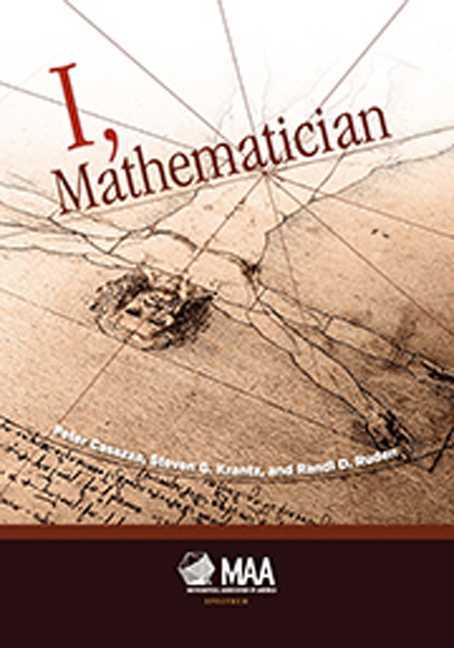Book contents
- Frontmatter
- Contents
- Preface
- Part 1 Who Are Mathematicians?
- Foreword to Who Are Mathematicians?
- 1 Mathematicians and Mathematics
- 2 What Are Mathematicians Really Like? Observations of a Spouse
- 3 Mathematics: Art and Science
- 4 A Mathematician's Survival Guide
- 5 We Are Different
- 6 The Naked Lecturer
- 7 Through a Glass Darkly
- 8 What's a Nice Guy Like Me Doing in a Place Like This?
- 9 A Mathematician's Eye View
- 10 I am a Mathematician
- Part II On Becoming a Mathematician
- Part III Why I Became a Mathematician
7 - Through a Glass Darkly
from Part 1 - Who Are Mathematicians?
- Frontmatter
- Contents
- Preface
- Part 1 Who Are Mathematicians?
- Foreword to Who Are Mathematicians?
- 1 Mathematicians and Mathematics
- 2 What Are Mathematicians Really Like? Observations of a Spouse
- 3 Mathematics: Art and Science
- 4 A Mathematician's Survival Guide
- 5 We Are Different
- 6 The Naked Lecturer
- 7 Through a Glass Darkly
- 8 What's a Nice Guy Like Me Doing in a Place Like This?
- 9 A Mathematician's Eye View
- 10 I am a Mathematician
- Part II On Becoming a Mathematician
- Part III Why I Became a Mathematician
Summary
Prolegomena
Education is a repetition of civilization in little.
—Herbert SpencerBeing a research mathematician is like being a manic depressive. One experiences occasional moments of giddy elation, interwoven with protracted periods of black despair. Yet this is the life path that we choose for ourselves. And we wonder why nobody understands us.
The budding mathematician invests an extraordinarily long period of study—four years of undergraduate study and five years or more in graduate school—in order to attain the Ph.D. And that is only an entry card into the profession. It hardlymakes one a mathematician.
To be able to call yourself a research mathematician, you must have proved some good theorems and written some good papers thereon. You must have given a number of talks on the work, and (ideally) you should have either an academic job or a job in the research infrastructure. Then, and only then, can you hold your head up in the community and call yourself a peer of the realm. Often you are thirty years old or older before this comes about. It is a protracted period of apprenticeship, and there are many souls fallen and discouraged and indeed lost along the way.
The professional mathematician lives his life thinking about problems that he/she cannot solve, and learning from his/her repeated and often maddening mistakes. That he/she can very occasionally pull the fat out of the fire and make something worthwhile of it is in fact a small miracle. And even when he/she can pull off such a feat, what are the chances that his/her peers in the community will toss their hats in the air and proclaim him/her a hail fellow well met? Slim to none at best.
In the end, we learn to do mathematics because of its intrinsic beauty, and its enduring value, and for the personal satisfaction it gives us. It is an important, worthwhile, dignified way to spend one's time, and it beats almost any other avocation that I can think of. But it has its frustrations.
There are few outside of the mathematical community who have even the vaguest notion of what we do, or how we spend our time. Surely they have no sense of what a theorem is, or how to prove a theorem, or why anyone would want to.
- Type
- Chapter
- Information
- I, Mathematician , pp. 71 - 85Publisher: Mathematical Association of AmericaPrint publication year: 2015
- 2
- Cited by

